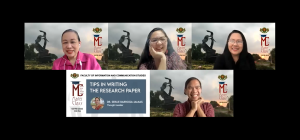
Dr. Serlie Jamias (upper left) served as the thought leader for the Masterclass; along with her is Dr. Benjamina Flor (upper-middle), moderator; Dr. Emely Amoloza (upper right), emcee; and Mr. Jerry Donato (lower right), co-proponent of the FICS Masterclass
The UP Open University (UPOU) Faculty of Information and Communication Studies (FICS) conducted a Masterclass entitled “Tips in Writing the Research Paper” with Dr. Serlie Barroga-Jamias as its thought leader. The lecture was virtually held on 03 February 2022 through Zoom, Facebook Live, UPOU Networks, and YouTube.
With the topic being relevant to various individuals coming from different institutions nationwide, it’s not a surprise that the event garnered 3100 pre-registered participants. Dr. Emely Amoloza, the emcee for the event, started with acknowledging all the participants and guests. Mr. Jerry Donato, co-proponent of the FICS Masterclass: Lecture Series from Thought Leaders, then gave the rationale for the activity which first started in 2017. FICS Dean, Dr. Alexander G. Flor, welcomed the participants and shared a brief story about Dr. Jamias attesting that she might be the “most credible resource person one could have”, given her extensive research experience.
Dr. Serlie Barroga-Jamias, a Professor both at UPOU and at UP Los Baños College of Development Communication (UPLB-CDC), is a researcher, writer, editor, and trainer on writing popular, technical, and scientific articles. She finished her Ph.D. in Communication from Macquarie University in Australia and completed her MS and BS degrees in Development Communication from UPLB. She was also a Fulbright-Humphrey Fellow in Journalism, Media Literacy, and Science Communication at the University of Maryland in the U.S. Before she became a faculty and administrator at UPLB, she began her career as a University Researcher at the College of Agriculture. Currently, she serves as language editor and/or reviewer of various journals in the country.
Dr. Jamias began her lecture by differentiating the philosophical assumptions of a qualitative and a quantitative research paper, the approaches by which a researcher’s writing style will depend on. She also discussed the parts of a research paper and gave tips on how to write each part. According to her, it is important to have an interesting introduction that cites the topic’s importance, gaps, specific research questions, and the general outline of the paper. She also suggested several electronic sources that could help craft a good literature review, emphasizing that all the references should be cited in the references section. She added tips on how to have a “meaty” methodology and method, as well as making a “coherent story of discovery” through a deep discussion of the study.
After the lecture, Master of Development (MDC) Program Chair, Dr. Benjamina Flor, moderated the open forum. Dr. Serlie Jamias answered some of the participants’ questions about research paper writing. Questions ranged from how to avoid unintentional plagiarism, to doing research during the pandemic, as well as the nuances one must consider when doing phenomenological research. One key takeaway from her Masterclass was how to ensure the quality of research. According to her, “When you continue reading and continue writing, it becomes a lifestyle for the sake of science, for the sake of knowledge.“
“With all this information around us, what else is there to discover?”
This question was posed by Dr. Jamias as she answered one of the participants’ questions. When asked what the most basic knowledge or skill a student should master in preparation for thesis writing is, she emphasized two key characteristics: a sense of humility and a sense of wonder. Continuing the question she asked earlier, she said, “With a humble heart and a sense of wonder for discovery, these create enthusiasm to see things in a different perspective.”
Masterclass: A Lecture Series from Thought Leaders is a free quarterly activity conducted by FICS as part of its extension programs. With thought leaders typically being academics and experts in the field of communication, Masterclass aims to capture and preserve their knowledge so that it can be used by future generations. It facilitates the transfer and exchange of ideas from thought leaders to participants. Through this, FICS hopes to serve as a platform for the participants to start their own discovery in research, echoing the call of Dr. Jamias, “for the sake of science, for the sake of knowledge.”







